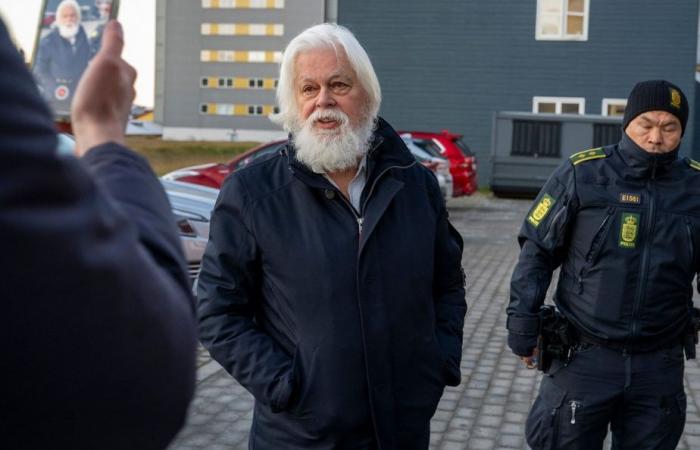(Copenhagen) Paul Watson was released on Tuesday after Denmark rejected Japan’s extradition request for the environmental activist, saying his detention helped draw attention to the “illegality” of hunting to the whale.
Posted at 6:50 a.m.
Updated at 8:34 a.m.
Camille BAS-WOHLERT
Agence France-Presse
“My arrest has drawn international attention to Japan’s continued illegal whaling operations,” Mr. Watson said in a video interview with AFP. “very fit” for his “first day of freedom in five months”.
“These five months were an extension of the campaign” against whaling, said the 74-year-old American-Canadian who was arrested in Nuuk on July 21 after the relaunch of a request issued by Japan in 2012 via an Interpol Red Notice.
Japanese authorities accuse him of being co-responsible for damage and injuries aboard a Japanese whaling ship in 2010 as part of a campaign led by the Sea Shepherd organization.
They “have the audacity to accuse me of something minor. My real crime was to denounce their illegal operations,” insisted Mr. Watson who was en route with his ship on John Paul DeJoria to intercept a brand new Japanese whaling factory ship when it was stopped.
Contacted by AFP, Japanese diplomacy did not react immediately.
Denmark based its refusal on “the total duration of the detention of Paul Franklin Watson following his arrest on July 21, 2024 and until a possible extradition decision can be executed, and on (the) fact that the acts for which extradition is requested date back more than 14 years, as well as the nature of the acts in general,” according to the decision consulted by AFP.
“Japan tried to silence a man whose only crime is to have denounced the illegality of the industrial massacre disguised as scientific research,” reacted to AFP another of his lawyers, Mr.e François Zimeray.
Paul Watson “will be able to resume his action for respect for nature, which is also a fight for humanity and justice,” he added. “We are proud to have led this legal and political fight alongside his loved ones.”
In the immediate future, Paul Watson will return to France where his family lives.
“That’s what’s on my mind right now. And it’s good to be here before Christmas because I haven’t seen them since June,” he said.
“Fight not over”
“The fight is not over yet,” underlined another of his advisors.
“We will now have to attack the red notice and the Japanese arrest warrant, in order to be certain that Captain Paul Watson can once again travel anywhere in the world, with complete peace of mind, and never experience a similar episode again,” Jean Tamalet, of the King & Spalding firm, told AFP.
“I should not be on this list,” insisted the activist. “The Interpol Red Notice is intended for serial killers, war criminals and major drug traffickers. No one is on this list for trespassing on private property.”
The detention of the activist, engaged for around fifty years in the defense of whales and known for his violent actions, aroused an outpouring of sympathy in France where the authorities had asked Denmark not to extradite him, as well as among environmental defenders.
“What a relief!” I welcome the release of Paul Watson, after 149 days of detention in Denmark. Welcome back to his people. Collective mobilization has paid off,” said the French Minister of Ecological Transition, Agnès Pannier-Runacher on X
In addition to the nature of the prosecutions which they considered unfounded, its defenders denounced in particular the fallibility of the Japanese judicial system.
For François Zimeray, in “Japan, there is a presumption of guilt”. “Prosecutors are proud to announce that they have a conviction rate of 99.6%,” he lamented.
The Danish government has distanced itself from these claims.
“This decision does not mean that Denmark shares the concerns that have been expressed in some quarters about the Japanese legal system and the protection of human rights in Japan in the context of this specific case,” the minister stressed. of Danish Justice, Peter Hummelgaard, quoted in a press release.
“Japan is a democratic society governed by the rule of law that respects basic human rights,” he wrote.






